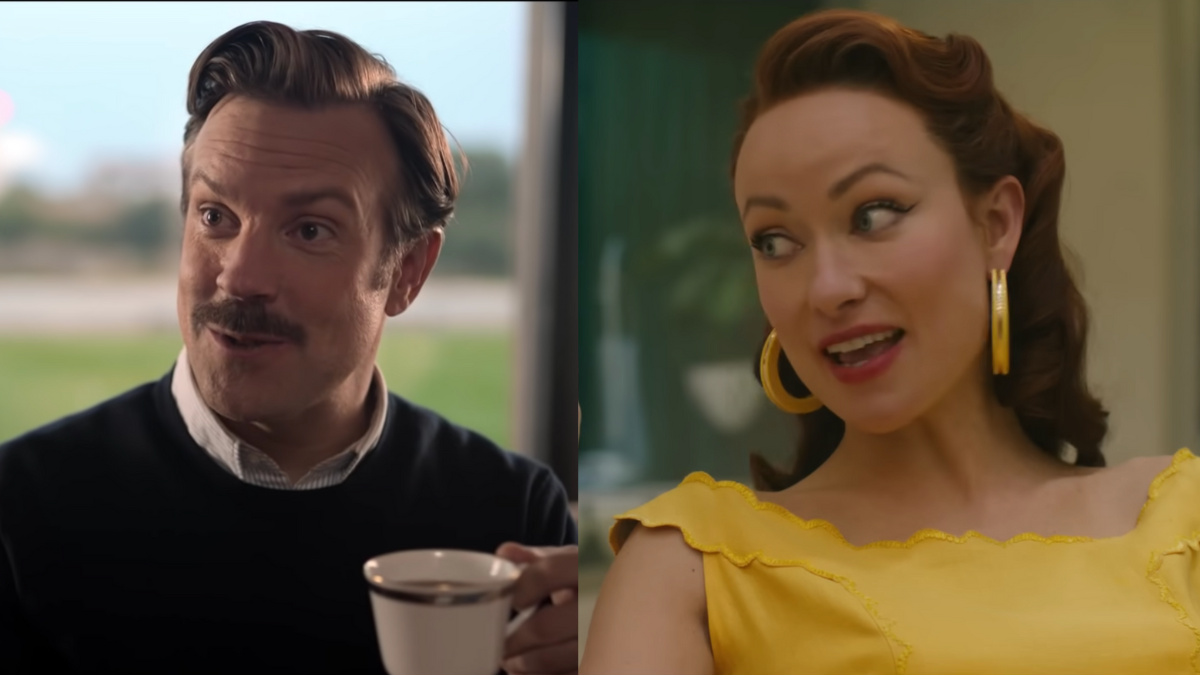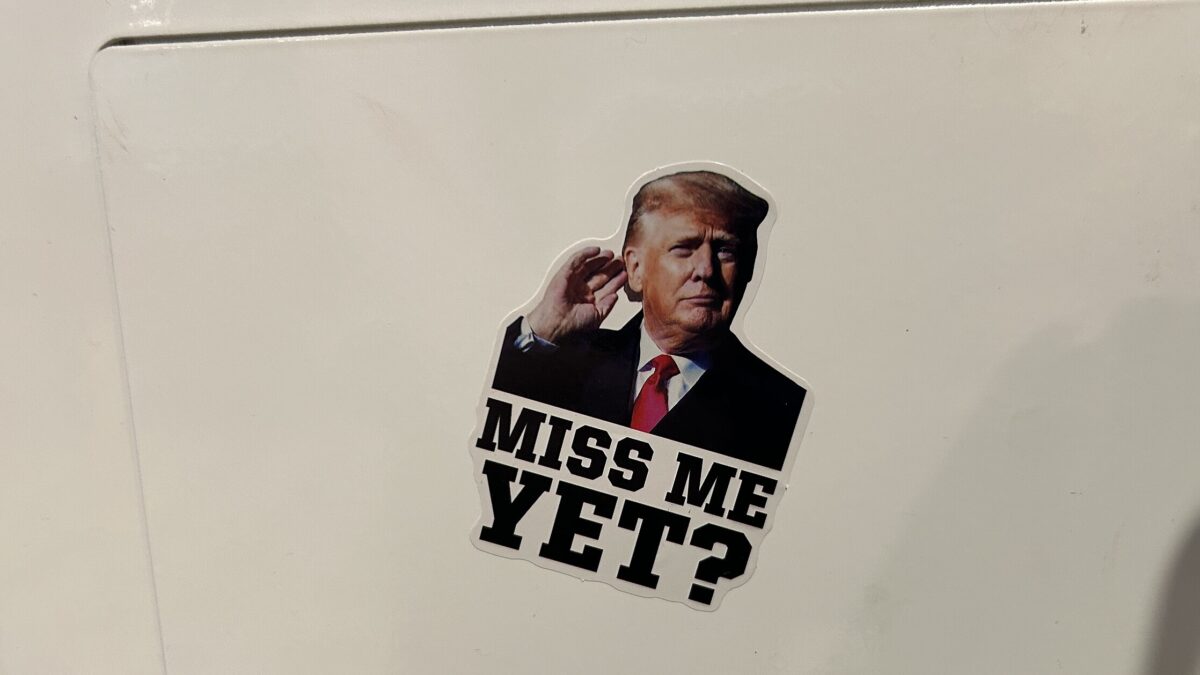In 2020, after seven years of dating, Olivia Wilde and Jason Sudeikis broke up. They have two children together. At the time, they were both working on projects with protagonists in unhappy relationships. Sudeikis’s project was the endearing series “Ted Lasso,” which features him playing an optimistic, charming soccer coach. Wilde’s was “Don’t Worry Darling,” a heavy-handed feminist piece about a woman escaping a 1950s-style male-power fantasy simulation. In both cases, their art seems to be a form of therapy, but for Wilde, the drama of her life has overshadowed and undermined her artistic efforts.
Gossip plagued “Don’t Worry Darling” throughout its production. Shia LeBeouf was fired (or was he?). Wilde was served custody papers while on-stage promoting the movie. Wilde began dating the leading actor she hired to replace LeBeouf: Harry Styles. Florence Pugh, the lead actress, was upset that trailers reduced her role to sex scenes with Styles. Did Styles spit on Chris Pine? Oddly, the drama around the movie became a meta-commentary on the themes of the movie itself: gender roles, masculinity, and power.
Wilde called Jordan Peterson “a pseudo-intellectual” and “incel hero,” who inspired the film’s villain. Both these claims have rightly been discredited, but Wilde reveals a fundamental misunderstanding of Peterson’s appeal by claiming he “legitimizes” incels. Peterson explicitly warns against resentment and complacency. Rather, his teaching to young men could be summarized in 4 words: Grow the hell up! Peterson appeals to young men because he presents a positive vision for masculine aspiration, a preferable alternative to Wilde’s world, where men are either oppressors or betas. Harry Styles manages to ─ between his work on camera and on the press circuit ─ be both.
Wilde originally cast LeBeouf as the lead, but she claimed that he brought too much “combative energy” (something Peterson might argue is a positive masculine impulse wrongly discouraged). To replace LeBeouf, she chose Styles, the epitome of the effeminate man. He wears nail polish, flamboyant clothing, and does ridiculous photo shoots. His strength in the film, according to Wilde, is his passivity, his willingness to allow “the brilliant Florence Pugh to hold center stage.” On the press circuit, he appears lost, lurching between fillers and canned buzzwords. Quotes below are literal:
On the struggles of men today:
“I think in society in general; I think, uh, you know, it’s probably more obvious now and probably more talked about now, still not as much as it should be, but I think obviously, like, mental health around, uh, you know, for, for, I mean for everyone, but, you know, the kind of the suicide rates and stuff in males is higher, right?… I read, uh, ‘The Will To Change’ by Bell Hooks, which I thought was, like, the best kind of explanation of, like, the history of, um, kind of toxic masculinity and male rage and all of those things which I think reading that after doing the film there’s, like, a lot of, you know, kind of things that kind of correlate for sure.”
“The themes of, um, the kind of, like, gender roles of the kind of time in which the film feels to be set and things are very kind of, uh, you know, it feels, like, very kind of traditional, uh, kind of misogynistic time. I think it’s incredibly relevant today, um, obviously everything that’s happening with kind of women having their rights over their own bodies taken away so it’s kind of, uh, you know, it’s a scary point to kind of realize how not, uh, kind of vintage that is, even if you’re looking at all of these vintage cars and vintage clothes and vintage architecture and stuff a lot of the themes are incredibly relevant now.”
“My favorite thing about the movie is, like, it feels like a, like a movie. It feels like a real, like, you know, go to the theater film movie that, you know, you you kind of, the reason why you go to watch something on the big screen.”
It may seem odd that Wilde, clearly a capable woman, would break up with the father of her children and partner of seven years and then choose to date a bimbo pop star 12 years her junior. While there’s something surreal about watching a 38-year-old mother of two become a Harry Styles groupie wearing ribald t-shirts, there’s a certain logic to her choice.
Men can be oppressors as they are in her film. These 1950s-era men are sloppily categorized as complete villains to be opposed at all costs. And then, there are the real-life men of 2022 who she dates and directs, fops like Chris Pine and Harry Styles. These men are so emasculated that they are, at best, fun diversions and otherwise irrelevant. Wilde’s advice to men seems to be: Shut the hell up. Judging from his interview, Styles is well-suited to such a calling.
Wilde’s ex, Jason Sudeikis, has created in “Ted Lasso” therapeutic art of a different sort. Like Wilde, his work features a protagonist in an unhappy marriage. The titular Lasso is cheerful and kind, but we learn his marriage is crumbling. His wife tells him she doesn’t love him anymore and wants a divorce. However, at this point, his piece diverges. In “Lasso,” Ted is heartbroken but tells his wife that she shouldn’t stay miserable for him.
We watch as he suffers mightily, turning to alcohol and then therapy to try to work through the pain of his divorce and estrangement from his children. He doesn’t conclude that the problem was the institution of marriage and stable families and that all women are evil. Instead, Sudeikis’s show treats the serious topics of marriage and family and responsibility to the next generation with the respect and nuance that they deserve. Wilde’s focus is on women’s fulfillment alone.
Ted Lasso is a cultural icon because he’s a rare TV character (and modern man) who’s wholesome and worthy of emulation. While his folksy Midwestern attitude is certainly not macho, he’s no pushover either. He endures withering criticism and rudeness with kindness, humility, and grace. He is a father figure to his players, and he calls them to excellence on the pitch through a positive and encouraging vision, not abuse and belittlement. He calls them to something greater than merely beta or oppressor.
“Don’t Worry Darling’s” failures are emblematic of the shortcomings of modern feminism: harsh criticism with no desirable alternative. Wilde’s life and movie present liberation that is neither instructive nor worthy of imitation.
Sudeikis has taken a different path. He’s made art that aims for a smile rather than a scream, optimism over pessimism, building up rather than tearing down. Sudeikis has emerged from the crucible with something to offer. Ironically, it is Wilde who is stuck in a fantasy.









